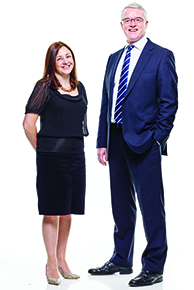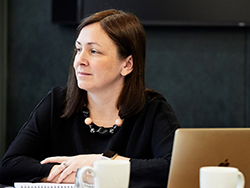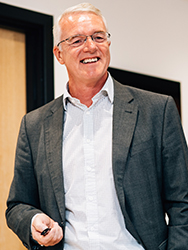 Naomi Rive and Martin Hall founded private wealth and fund administrator Highvern Group via a management buy-out of Coutts & Co Trustees. Nearly four years on, they tell us how the service offering has changed since becoming owner-managed, where the next growth opportunities lie for wealth businesses – and how coronavirus will affect their markets
Naomi Rive and Martin Hall founded private wealth and fund administrator Highvern Group via a management buy-out of Coutts & Co Trustees. Nearly four years on, they tell us how the service offering has changed since becoming owner-managed, where the next growth opportunities lie for wealth businesses – and how coronavirus will affect their markets
What are your personal backgrounds and what brought you to the Channel Islands?
Naomi Rive: Well, I’m Jersey born and bred. Like lots of islanders, I grew up to hardworking parents, which is something that really rubbed off on me and my siblings. Although I went away to England to study law, within a few years I was back here because that’s the lure of Jersey.
Jersey gives you a great quality of life – and the quality of work, especially for young graduates, is also incredibly good, so it was hard to stay away.
Martin Hall: My story couldn’t be more different. I grew up in 1970s England, studied art and architecture there, and worked in publishing briefly with Penguin Books. That was fascinating, but it didn’t give me the opportunity I was looking for to live and work abroad. So I moved into an international bank, and many years later, having travelled and lived abroad extensively for work, here I am settled in the Channel Islands.
Tell us about the management buy-out that culminated in Highvern being formed.
MH: Over the course of my 25 years or so in private banking, I ran various parts of the organisation – on the trust side, the investment side and the banking side. But I had a growing desire to run my own business and I guess all of that experience and knowledge really culminated in the opportunity to do so through the management buy-out.
NR: I was a Partner at Appleby in 2013 when Martin first approached me to join him at Coutts. I was looking for a new challenge after having children, and working within the trust industry was an exciting opportunity.
In particular, I felt that client needs were becoming more sophisticated, and the opportunity to become a trusted adviser to some high-quality private client relationships really appealed to me.
Already with a great client base and reputation, we both felt we could set up a highly professional and attractive firm, while also offering something quite different. We also knew that we wanted to create a new brand that spoke of quality and substance.
How do your roles differ within the day-to-day running of the business?
NR: We definitely bring different skills. Martin has plenty of experience running businesses and large teams. I’m much more from a technical, legal background and the client management side – and that’s still very much how we split the business today.
Martin is the MD, while I focus on business development, developing our technical skills and dealing with regulatory and compliance issues. Along with our colleagues in the funds business, we now have a great balance of legal, accounting and operational experts, culminating in a highly complementary and effective leadership team.
How do you differentiate yourselves in a crowded marketplace and what are your plans for expanding the business?
MH: The core philosophy is that we’re all about setting new standards. We really want to push the boundaries in this industry. We see a lot of competitors growing very fast but we feel that can lose you the critical client intimacy, and affect how well you know your clients – how flexible and tailored you can be to their needs.
We don’t want to do it that way. We want to focus on quality, expertise and the value we can add through a truly deep relationship.
We are obviously focused on growing, but doing so in a quality way and being able to give every new client the assurance that what we say in a pitch is actually what they’re going to get when they join us.
The interesting thing on the private side is that someone’s purchase decision is made not necessarily just for a transaction this week, but for the generations to come. So being able to offer continuity is key.
 NR: There are principally three core ownership models for our type of business on the islands. There are the banks, which tend to see our services as one of relationship deepening and don’t always focus so much on the commerciality of what we do. That can be detrimental to investment in staff and technology in the long term.
NR: There are principally three core ownership models for our type of business on the islands. There are the banks, which tend to see our services as one of relationship deepening and don’t always focus so much on the commerciality of what we do. That can be detrimental to investment in staff and technology in the long term.
At the opposite extreme, there are the private equity-backed businesses whose ownership sometimes culminates in listings. Those businesses face polar opposite challenges in terms of business growth and margins.
Then, somewhere in the middle, there are a few like us – an independent business in between the two.
Of course, we are now much more commercial than we were – but it’s not all about the bottom line for us. We invest heavily in relationships where we see wider potential, and work closely with those clients, whether corporate or families, to help them achieve their goals. This usually coincides with a stronger and more profitable relationship for us.
We also focus on the quality and integrity of the structuring we are asked to provide. I’m very keen to ensure that the finance industry in Jersey goes from strength to strength and that we can continue to bring the next generations of graduates back to the island.
For that reason, I want Jersey to be known for its legal, regulatory and governance expertise – and I think all businesses need to work hard to overcome some of the negative connotations about offshore centres. Our business and risk strategy certainly takes the reputation of the island very seriously.
It’s now nearly four years from the management buy-out. What have been the biggest changes to your approach and your client base?
MH: I think the biggest and most obvious change since we took on ownership of the business is that we have become significantly closer to our clients. Our entire proposition now is around what we can deliver for them – rather than simply being a tool to support asset-gathering.
It’s very much about understanding the long-term goals of our clients. And we’ve also launched a successful fund administration business that’s aligned to the same philosophy.
NR: Of course, it’s important to remember that when we became independent, it wasn’t like we started a greenfield business, which is hugely challenging.
The business was established in the 1960s, and we inherited a high-quality and mature book of clients. But the move has absolutely enabled us to combine that with our own ethos and approach.
How does being owner-managed change the proposition for clients?
NR: Being independent means we can be more relationship focused, and that is now a massive selling point for us. We want our clients to see that we are flexible, can-do and faster to react because of our size and ownership model. It’s also really valuable to our clients’ advisers. They want to work with people who are focused on the longer term and put clients first.
What does a ‘successful Highvern’ look like five or so years from now?
NR: We’re definitely focused on growing and developing a highly sustainable brand and business. However, as we said earlier, we don’t want to grow too quickly or at the expense of our proposition; we want to grow in our space, becoming a bigger and more important player in the market over time.
MH: It’s important to remember that a lot of the business we’re winning is precisely because we are independent. To be able to come in and meet your prospective trustee and also meet one or both of the owners of the business – who are committed to staying close to it – is very compelling.
We want to grow, but never at the expense of being able to deliver great expertise and fast decision-making. That’s almost a tangible difference that we can deliver.
 Do your growth plans include greater international expansion and more jurisdictions?
Do your growth plans include greater international expansion and more jurisdictions?
MH: What comes next will be controlled expansion. While we are Jersey-centric, we do want to be in more jurisdictions, with more service lines – but only if they are complementary. We will consider some suitable acquisitions. But I don’t think we will be in 20 to 30 jurisdictions 10 years from now. You’re more likely to see us in a handful of very carefully and well-chosen jurisdictions.
So Jersey will continue to be the focus? What is it that makes the Channel Islands such a strong proposition?
NR: Jersey is a high-quality jurisdiction, and that is integral to our proposition and hard to replicate elsewhere. We won’t run into another jurisdiction where we don’t have confidence in the legal and regulatory environment for our clients or ourselves as a business.
MH: Jersey will remain the heartbeat of the business. One of the things that amazes me and is really comforting is that it has the strength of all that infrastructure, but also decades under its belt of dealing with challenges from the outside world – proving its resilience in a very entrepreneurial way. This place knows how to deal with challenges and how to come out the other side stronger.
What impact do you think the coronavirus pandemic will have, both on your business and on the wider wealth space?
NR: Like many businesses, we invoked our business continuity plan quickly – enabling people to work remotely – and we’re delighted to see that our investment in the IT and infrastructure paid off so well.
In terms of this ‘new normal’ that everyone keeps talking about, personally I’m not convinced we will see such a sustained difference – I think many people will go back pretty much to the way we’ve done things before.
I think we flourish on human contact, so I don’t feel the long-term changes around working practice will be that different.
MH: I agree with that. This is, and will remain, a personal, people business. When you are entrusting tens or hundreds of millions of pounds, you want to be able to press the flesh and see the whites of people’s eyes.
As for the impact on the financial sector, for years to come lenders are going to be thoroughly focused on getting liquidity back into the market, so that SMEs and larger corporates can adjust and continue or rebuild themselves.
And for a long period of time, there won’t be such a huge tax take available for governments to support that either.
I think that in our field we’re going to see wealthy individuals and the dry powder amassed in funds globally over recent years filling that gap. So that speaks to great opportunity in many ways for businesses like ours and centres like Jersey.